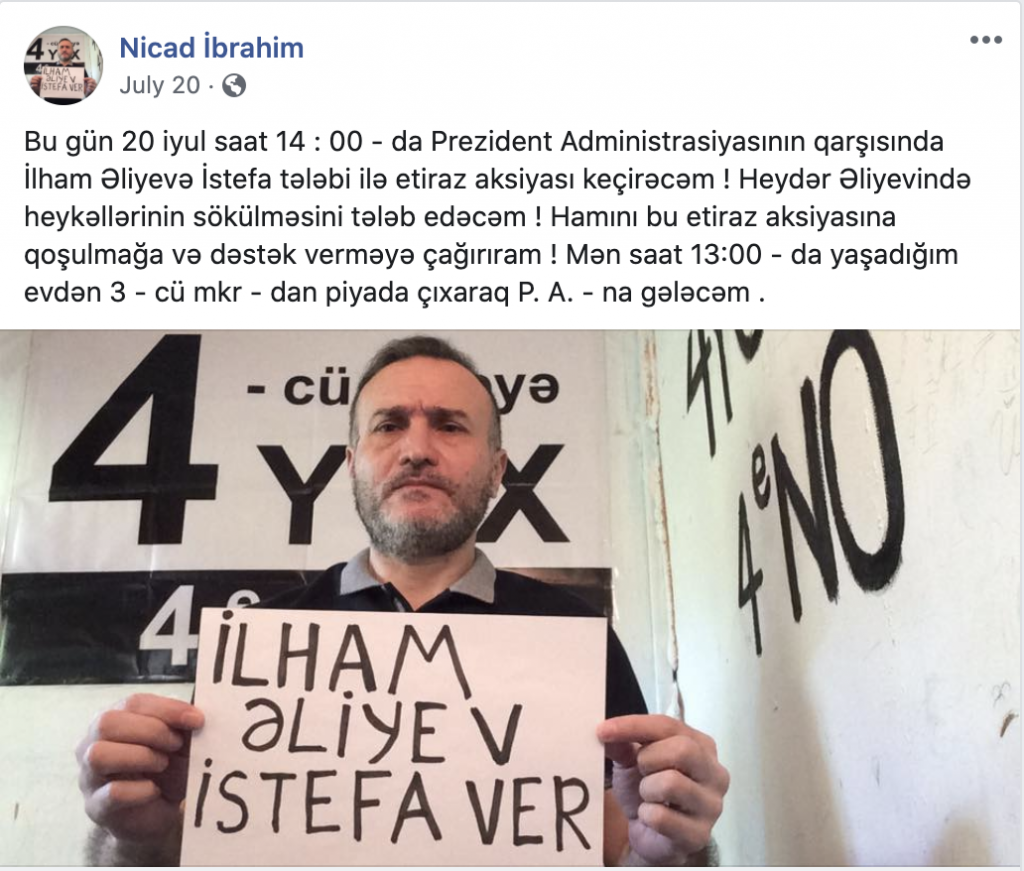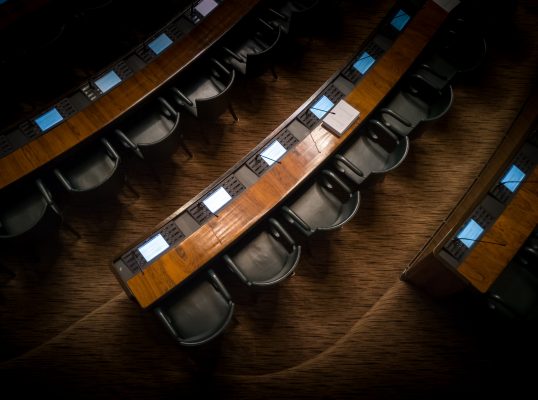This is part three in a series of detailed legal reports and analyses on existing legal amendments, and new legislation affecting privacy, freedom of expression, media, and online rights in Azerbaijan and their compliance with international standards for freedom of expression.
In July, of last year, authorities in Azerbaijan released their very own COVID tracing tracker application. Launched by Tebib (Azerbaijan Administration of Regional Medical Division) the app was quick to draw attention, especially over its privacy issues.
|
The mobile app is operated by the Data Processing Center (DPC), which is the main structure of the information technologies of the Ministry of Transport, Communications, and High Technologies. According to the app’s version history at App Store, the application “update” was done on 27 May 2021. e-Tebib is just one of the deluge of apps unveiled during the height of the COVID-19 pandemic by various governments, promising to detect COVID-19 exposure and not only. |
Below, we break down the pervasiveness of the app having analyzed existing national and international legislation.
Features and concerns
According to the app’s description, “E-Tebib is designed to inform users in real-time about the number of patients (both sick and recovered) in Azerbaijan.” Since the start of the pandemic, the official data for Azerbaijan on the number of infected patients and recoveries were made available here and the numbers were updated once a day – based on the numbers reported by the Operational Headquarters set up under the Cabinet of Ministers of the Republic of Azerbaijan (the unit was established on February 27, 2020). Already from the start, it was unlikely the app was going to provide real-time indicators when the main body in charge only shared the information once a day.
In addition, article 4.4 in the user agreement of the app, explicitly said that any information, obtained through the app, may not be precise, correct, or trusted. And yet, the app also claimed to reduce the number of infected patients by informing users of potential COVID infected patients around them via Bluetooth technology.
Although the app claimed it did not collect any personal data aside from the user’s phone number the article 5.3 of the license agreement stated, the center [the Ministry of Communication, Transportation and High Technologies who owns the app’s license] collected users’ names, last names, phone numbers, social media accounts, emails, national ID numbers, and location.
Article 5.1 mentioned the center was sharing this information with third parties. These third parties were allowed to analyze collected information including users’ browsing history [The center did claim that it did not allow third parties, to use the obtained information for other purposes]. Article 5.5.1 stated the center may share users’ information with government bodies and/or representatives’ legal requests; court orders; or under any other legal condition. Furthermore, article 5.6 stated that users’ information may be shared with third parties in other countries for security purposes.
What the law says
According to Article 5.1 of the Law on Personal Data personal information is protected from the moment it is collected and for this purpose, it is divided into confidential and public categories according to the type of access. Article 5.2 of the Law on Personal Data stipulates that confidential personal data must be protected by the owner, operator, and users who have access to this information on a level required by law. Confidential personal information may be disclosed to third parties only with the consent of the subject, except as provided by law. Article 5.3 of the Law on Personal Data defines open personal data as information anonymously duly declared, made public by the subject, or entered into the information system with the consent of the subject. The person’s name, surname, and patronymic are permanently open personal information.
The terms of the agreement [of the app] on sharing private information with the third parties are vaguely regulated and open to wide interpretation for unlawful transmission of the private information with third parties.
Furthermore, article 5.5.1 of the app’s agreement that states information might be shared upon the government representatives’ legal requests are problematic from the human rights perspective. It fails to specify on which grounds and under what conditions the state authorities might request the private information which is necessary for terms of procedural fairness and safeguards against arbitrariness.
Where personal information is stored for the interest of the protection of health, there should be adequate and effective guarantees against abuse by the state. The law in question, which allows the storing of such information, must indicate with sufficient clarity the scope and conditions of exercise of the authorities’ discretionary power. These standards to some extent are also backed in Article 11.2.2 of the Law on Personal Data which states that when collecting personal data, the owner or operator must notify the subject about the purpose of personal data that is being processed and the legal grounds of this purpose.
In other words, it is not clear whether any state authority can have access to private information simply upon requesting it without legal justification. This is also a requirement of the Law “About operational search activities” as per Article 10. Thus, Article 10 of the Law states that the extraction of information from technical communication channels and other technical means is carried out on the basis of the decision of the court [judge].
Article 5.10., of the app’s user agreement states that all user-related data is kept for a month. But it fails to explain whether the same expiry date applies to “third parties” that may have access[ed] [to the] users’ information. This is contrary to Article 8.2., of the Law on Personal Data. Law on Personal Data requires that for the purpose of collecting and processing of personal data (specifically Article 8.2.3.,) and conditions of destruction or archiving of personal data collected in the relevant information system after the expiration of the period of storage or after the death of the subject in the manner prescribed by law must include a written consent for the processing of the subject’s personal data.
| Such vagueness is also contrary to the ECtHR’s well-established case law. In Aycaguer v. France case, the ECtHR ruled, there was a violation of Article 8 (right to respect for private life) of the Convention by “determining the duration of storage of […] personal data depending on the purpose of the file stored […]”. The Court noted that, to date, no appropriate action was taken on that reservation and that there was currently no provision for differentiating the period of storage. The Court also ruled that the regulations on the storage of DNA profiles did not provide the data subjects with sufficient protection, owing to its duration and the fact that the data could not be deleted. The regulations, therefore, failed to strike a fair balance between the competing public and private interests. |
Another concern was that the application was developed by A2Z Advisors LLC and the app’s privacy policy was linked to the company’s website. The landing page of A2Z Advisors LLC, however, did not provide any information on the app’s privacy policy. At the time when the app was launched, AIW reached out for comment via email as per A2Z’s recommendation but never received a response.
Similarly, in the App Store for IOs when clicking on the “App Support” tab, the page once again led to the A2Z company website and once again failed to provide any information related to the App. Instead, the privacy policy was accessible via this link that a user had access to but only after downloading and launching the app. This in itself was contrary to the several articles of the Law on Personal Data.
According to Article 11 of the law, it is required, when collecting personal data, that the owner or operator, notifies the subject about the level of protection of personal data collected and processed in the information system [11.2.3.]; the information on the existence of a certificate of conformity of information systems and state examination [11.2.4.]; and the scope of the intended uses of personal data, including the information system for which the information is to be exchanged [11.2.5.]. However, no such information was provided in the app’s agreement.
The app was also not an open-source code and was licensed under the Ministry of Communication, Transportation, and High Technologies. This is contrary to the requirement [Article 6.22.,] of the Resolution of the Cabinet of Ministers about “Requirements on creation and management of Internet information resources of state bodies”, which requires that open source content management systems should not be used in internet information resources.
FaktYoxla, a fact-checking platform in Azerbaijan concluded after a detailed legal analysis over the license agreement that e-Tebib was not designed in accordance with the national legislation on data privacy. The fact-checking platform, having analyzed the respective case-law of the European Court, the EU Data Protection Directive, and the Council of Europe Treaty 108, concluded that the e-Tebib application contradicted the obligations imposed by international standards.
On July 10, 2020, following widespread privacy concerns and questions over the app’s transparency, changes were made to the terms of the agreement.
|
Originally users’ information was transferred to third parties, which were not explicitly defined in the agreement. At the time, independent experts and lawyers said this was against Article 32 of Azerbaijan’s state constitution and in violation of Article 8 of the European Convention on Human Rights. Azerbaijan’s constitution, namely, Article 8, stipulates that no one has a right to collect personal information without an individual’s permission. The convention, on the other hand, refers to respect for privacy. ***In Copland v. the United Kingdom case (no. 62617/00, ECHR 2007-I), the Court found that it was irrelevant that the data held by the college where the applicant worked was not disclosed or used against her in disciplinary or other proceedings. Just storing the data amounted to an interference with private life. |
The updated license agreement said that only under necessary circumstances, and within the normative legal framework personal information may be transferred to third parties. The revised agreement, still, fails to explicitly mention the precise list of institutions considered under third parties.
Fuad Niftaliyev – the head of the app development project later explained that the third parties referred to in the agreement are the Ministry of Health, Tebib, and the Operational Headquarters [set up under the Cabinet of Ministers of the Republic of Azerbaijan]. Niftaliyev clarified that the collected information was stored on the servers operated by the Ministry of Communication and Information, however that too was problematic, given the questionable transparency of the government institutions in Azerbaijan especially as surveillance technology is widely used by the ministries alike.


![activist accused of intentionally spreading coronavirus [updated February 17, March 5]](https://www.az-netwatch.org/wp-content/uploads/2020/03/bill-oxford-OXGhu60NwxU-unsplash-600x332.jpg)

![member of an opposition party fined over social media post [Last update July 9]](https://www.az-netwatch.org/wp-content/uploads/2020/03/glenn-carstens-peters-npxXWgQ33ZQ-unsplash-600x400.jpg)

![Opposition activist, Instagram account hacked [updated]](https://www.az-netwatch.org/wp-content/uploads/2020/04/alex-ware-iIn8IKBOva0-unsplash-600x337.jpg)
